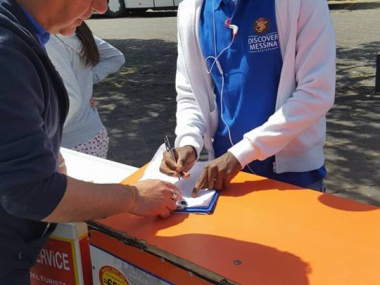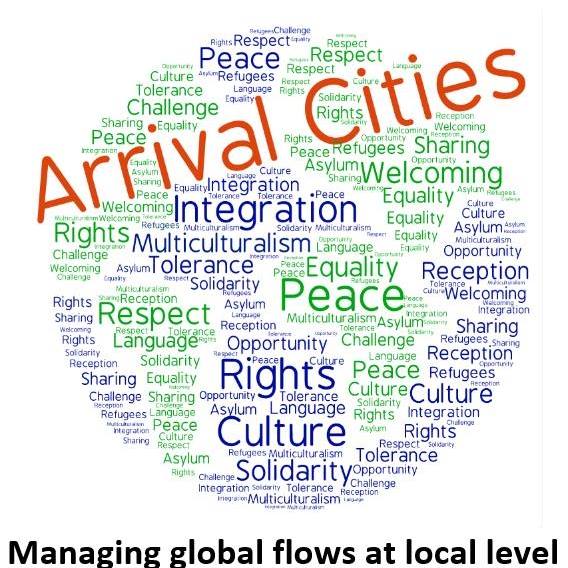Refugees and urban sustainable development: Messina’s experience with Arrival Cities
Edited on
02 October 2018This is an extract from Simone D’Antonio interview to Nina Santisi Councillor for Social Policies in the Municipality of Messina.

Among the hundreds of the Italian Municipalities involved in the reception system for refugees and asylum seekers, only few of them have the specificities of Messina. A City that, due for its geographical position that connect Sicily with Italy and in a broader sense the Europe to the Mediterranean, is at the same time place of arrival and transit for refugees and asylum seekers.
Messina is currently the sole Italian City that is involved in an URBACT project that directly addresses the theme of the integration of migrants. Messina is representing in Europe not only its experience but the whole Italian reception system; an important contribution that the City gives not only in occasion of transnational workshop, but also through the work of the local support group that, thanks to its diverse composition, represents local stakeholders as well as addressing the peculiarities of the migration fluxes reaching Messina.
The main challenge addressed by the City is to achieve an integrated approach in the services delivered by different institutions and entities working in Messia’s metropolitan area and province. As an example, through its Integrated Action Plan the City intends to foster the collaboration among local health units, local governments and reception centres in order to achieve a collaborative governance and stakeholder’s participation in design local policies. In this sense the development of a participative Action Plan can be a very good way to improve social services not only for migrants but also for locals. Among the challenges identified by the Messina’s local support group, one of the most important is how provide better reception and integration services for vulnerable groups of migrants, as children, young mothers or people with health and mental problems. This is why the local health units play a very crucial role in giving to migrants health, psychological and social support.
Nina Santisi, Councillor for Social Policies, explains that Messina’s Local Group is addressing in particular the issue of the “Second Reception”, that means the phase just after the “First aid” that deals more with the integration of migrants, starting by the SPRAR (Protection System for Refugees and Asylum Seekers) model. The objective is to achieve the improvement of the reception and integration system, as an example by building partnerships with sport associations, along with a system of hosting families, trying to shape the inclusion path of each vulnerable group according to its needs and difficulties and creating a closer relation among local association, health services and local governments. Nonetheless Messina is also engaged in developing the integration ad reception services for other migrant groups as well as providing first aid services.
Mrs. Santisi also affirms that Messina has a long experience and tradition of hospitality and it must be said that in Messina’s model an important role is played by the civil society, that demonstrated the will to share with local authorities the migrants issue, stressing the common responsibility face to migrants reception. The participation of the whole local community, local associations, schools and sports associations has been crucial in order to create a reception system that address the specific need of each group.
Concerning the needs that emerged from the work done so far in the framework of the project, Mrs. Santisi says that there is the need to work more on the relocation of migrants, to provide faster and more effective relocation procedures for unaccompanied minors. Through the participation in the Arrival Cities Project, and the collaboration with other municipalities in Europe, Messina seeks to become a place where to experiment pilot programmes of intervention aimed at improving not only the integration system but the whole approach of local welfare system.
The idea to develop a system of hosting families for refugees and asylum seekers, already experimented in other Italian cities (Parma and Trieste) could be a good solution to make the reception measure more sustainable on the economic and social level. Following Nina Santisi’s opinion “this can be an effective measure of new local welfare”.
Along with the participation to the Arrival Cities project the Municipality of Messina is also realizing a multifunctional structure that will host in the same place all kind of social services available in the city, dedicated to anyone (Italians and migrants) in need of social assistance. The foreigner users will have access to a series of services linked to the registration in the community (immigration offices, health services) together with the support of local NGO that will have the possibility to manage part of the spaces.
The centre will also be dedicated to develop cultural activities as well as education and courses ( ICT laboratories, theatre, civic education) fostering a real interaction and inclusion with the local community.
“The objective is to foster not only the hosting culture but also to promote the culture of inclusion” explains Councillor Santisi. The main goal remains the integration of the unaccompanied minors that, thanks to the network that the SPRAR operators, the schools and the sport association developed, breaking all prejudices and worries towards diversity, are everyday more and more involved in the city life.
In order to provide integrated services and a long term support, there is the need to overcome the current legislation (which foresee that at 18thyears old the young migrants have to leave the reception centres) and provide different types of supports aimed at following the integration process also for young adults. Another element that stresses the importance for Messina of being part of the Arrival Cities Network is the possibility of giving voice at national and EU level of the everyday challenges faced by many municipalities in Italy that already put in place in a small scale the Urbact participative method, through the collaboration of different stakeholders, giving an added value to the services put in place to foster social cohesion and local community development.
Read the full article Here
Photo from URBACT Italia
 Submitted by cvestrini on
Submitted by cvestrini on
